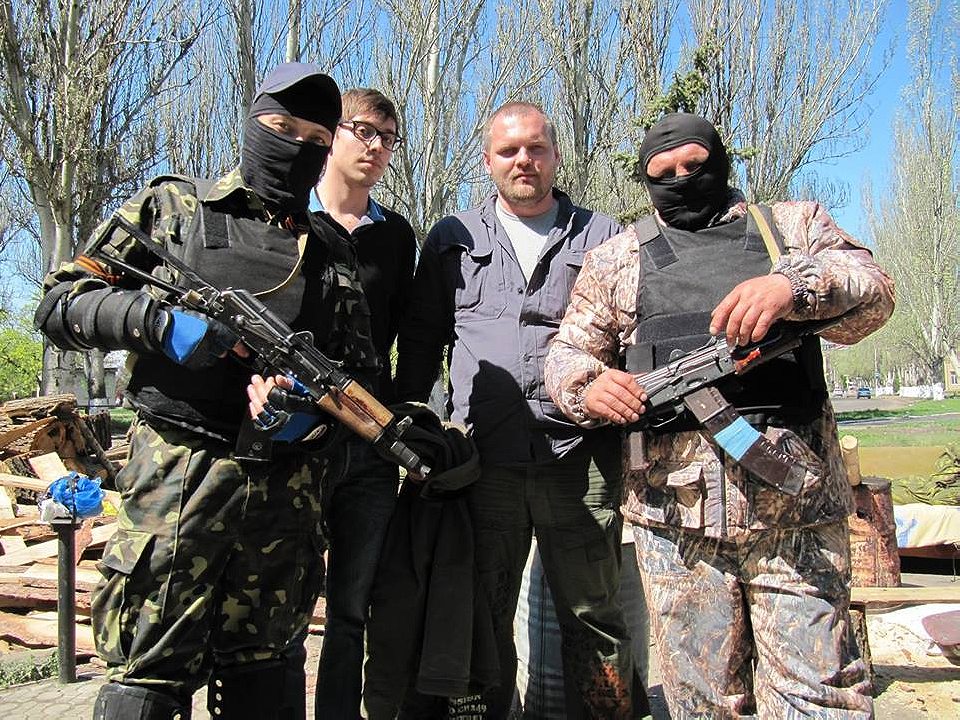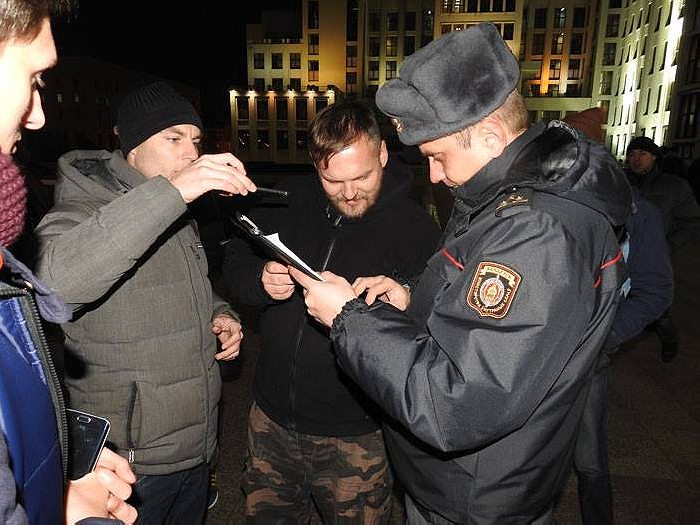What it’s like to work in journalism in Europe’s last dictatorship.
In international journalism, a local journalist hired by foreign reporters for his or her special knowledge of the local area, culture, and language is called a fixer. This series explores the untold stories behind their largely unrecognized work. You can read about fixing in China here and in Mexico here.
The small nation of Belarus, which has been called a “Soviet theme park” and Europe’s last dictatorship, is not an easy place to be a journalist. Independent journalism is mostly nonexistent, and journalists are harassed by the government of Alexander Lukashenko, who describes his own style of leadership as “authoritarian.”
“It’s impossible to stay under the radar when you work with the foreign journalists,” says fixer Dzmitry Halko, who also works as a journalist in the country. “Not so many of them come to Belarus, so it’s easy to spy on all of them.”
Roads & Kingdoms spoke with Halko over email about churnalism, life under an autocrat, and why Belarus isn’t North Korea.
Roads & Kingdoms: Tell me about your career as a journalist so far.
Dzmitry Halko: We had a period of blooming freedom in the last years of the Soviet Union and the first years of our independence, which was in the late 80s and early 90s. One could always find something really interesting in the newspapers and on TV, something eye-opening and mind-changing. I think that’s when I first caught the journalism bug.
From 2009 to 2011 I worked for Radio Free Europe/Radio Liberty in Belarus as a columnist and social network observer. From 2012 to 2013 I worked as a reporter and online editor for the newspaper Narodnaya Volya. Then I began to work as a reporter for another Belarusian newspaper, Novy Chas. Beginning with the protests in Maidan Square in 2013, I covered the revolution in Ukraine.

R&K: Are there common misunderstandings that foreign journalists have when they go to Belarus?
Halko: Knowing it’s a dictatorship, some of them think it’s something like North Korea. This makes them more afraid than necessary. A foreign journalist is not going to face any serious problems in Belarus, like being arrested or beaten, not to mention executed. The most serious problem they may encounter is being intimidated.
Others think of Belarus as a heavily corrupt state, where you can access anything you want through a bribe. In fact, almost nothing can be done here through a backdoor approach. Even if you have some informal personal contacts with the small potatoes it will lead you nowhere. Everyone is afraid to take responsibility, so the smallest decisions get kicked all the way to the top.
Some think, c’mon, it’s just an insignificant peripheral country, their officials will be happy to welcome foreigners. Their president seems to be an easy-going backslapper, let’s interview him! It’s a naive illusion. Belarusian officials are some of the hardest to reach in the world.
YOU HAVE TO BE CAREFUL WHEN DEALING WITH FACTS
R&K: What are some of the specific challenges of reporting in Belarus?
Halko: Paradoxically enough, we enjoy a relatively high level of freedom of speech in Belarus. It’s not like it is in some petro-monarchies or North Korea. You can criticize the system scathingly if you want. As long as you’re just expressing your feelings, it’s okay. Feel free to show your disgust, contempt, anger, disappointment, whatever, as long as you don’t insult the president or his family directly. But you have to be careful when dealing with facts.
Have you ever heard of the Teddybear Airdrop? In 2012, an airplane illegally entered Belarusian airspace and dropped several hundred teddy bears with notes carrying pro-democracy messages over Minsk. Authorities arrested a 20-year-old student journalist, Anton Suryapin, who did nothing more than post some of the first photos of the event on his website.
Another journalist, Aleksand Alesin, was charged with two separate counts of espionage and treason in 2014 after he said Belarus should reform its army in light of the crisis in Ukraine.
Yet, despite such excesses, I’d say that the main problem of journalism in Belarus is not danger of harsh punishment, which is relatively rare. The main problem is the absence of access to information. To get the real facts the authorities want to hide is next to impossible. And they want to hide as much as possible. “We prefer there will be no report at all than a bad one,” as a state official told me.
Also, you never know what might turn out to be forbidden. Basically, any law enforcement officer or state official may say you’re not allowed to be here or there, do this or that, without providing any reason. You obey or you face the consequences.
If you happen to be a “non-state journalist” you’re not really welcome anywhere. That’s why many non-state journalists in Belarus produce “churnalism,” or stories they don’t report themselves. Those who do something different, especially provincial independent journalists, face searches, wiretapping, surveillance, fines, confiscation of businesses, and whatnot.
R&K: Have you ever felt threatened while reporting in Belarus?
Halko: Though I worked mostly in Ukraine, on the very front line, the most fearful experience I had was in Belarus, in a humdrum city of 35,000 called Rahachou. I went to the city with a VICE News team early in the morning and visited a local independent journalist at his home, where he served us coffee and chocolate candies. After talking about our plans for the day we went together to the public park in the center of town. Well, to the place that was supposed to be a public park; actually, it turned out to be a dirty wasteland, a monument to local corruption.
As we got ready to leave the park, a white minivan with blackout windows (which only special services are allowed to have in Belarus) approached us. Out of it stepped a heavily made-up woman in a black leather coat, black leather gloves, black felt hat, and silk scarf. She identified herself as Tamara Vorobieva, local “head of ideology” and tried to persuade us to visit “prettier places,” assuring us the park would be built soon and hinting that we better get out of town.
We told her we were about to go to lunch. “You’ve already had your coffee and chocolate candies. Isn’t it enough? You’d better leave the town for somewhere else,” she said.
While having lunch, we were informed by a text message that we were going to be arrested for being drunk in public and causing a disturbance. As soon as we got into our car to go, the road was blocked by a truck. Our car was stopped and searched by the traffic police.
They then changed their mind for some reason and offered us, via text, a tour of the city’s attractions. We met with them and said we only wanted to talk about the park and [conduct] independent journalism. The “head of ideology” was enraged. “Why are you still here making troubles? Get out! Just leave our city right now! Don’t film me! You’ve got no right to film me!”
There was a bus full of government thugs waiting for us outside. They tried to provoke our team shouting, “Come here, you bunch of faggots, just dare to come and film us instead of the poor woman, you fuckers!”
We did not dare.

R&K: Have you ever been detained for your work?
Halko: I’ve spent between three hours and 10 days on different occasions behind bars. They used to charge me either with “taking part in an illegal rally” or “petty hooliganism (swearing in public).” The latter is their favorite charge. If you look at the statistics, you’ll see that a surprisingly large number of Belarusian civil society activists, opposition forces, and independent journalists swear like troopers.
R&K: What is the media environment in Belarus like now?
Halko: Browsing Belarusian media on an everyday basis is a drag, I must say. It feels like it is always the same fucking day. Investigative journalism is something everyone seems to have forgotten about. The analysts chew the same gum over and over again. The publicists have gotten exhausted, lapsed into mediocrity and mumble something hardly coherent.
R&K: Do you have hope that Belarus will become more open in the coming years?
Halko: In today’s world it is hard to believe in inevitable progress toward a better life. The West, which has been our guiding light and the center of gravity, is in turmoil itself.